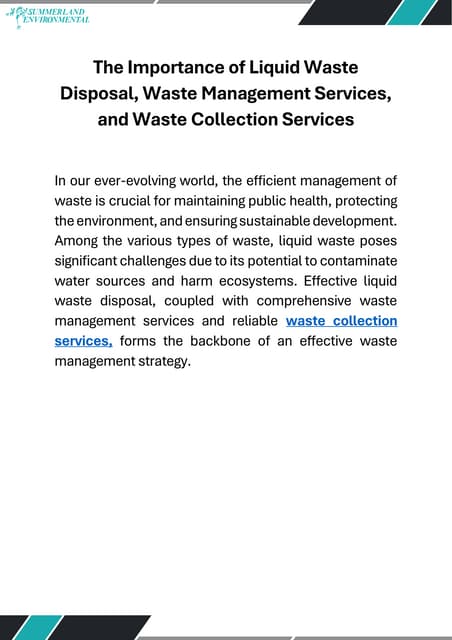Some Known Questions About Reclaim Waste.
Some Known Questions About Reclaim Waste.
Blog Article
Some Known Questions About Reclaim Waste.
Table of ContentsThe Of Reclaim WasteThe Ultimate Guide To Reclaim WasteThe smart Trick of Reclaim Waste That Nobody is Talking AboutThe Facts About Reclaim Waste UncoveredSome Ideas on Reclaim Waste You Should Know
Residential sewage waste refers to the waste and products from a property septic container. The correct management and disposal of domestic sewer waste require liquid waste to be moved to a sewer therapy plant where the appropriate methods and devices are used to detoxify and dispose of waste.
Commercial waste commonly consists of potential risks, such as combustible products or a mixture of liquid and solid waste items, and calls for an advanced and thorough disposal procedure. The disposal of commercial waste usually entails the purification of waste before transportation to make sure secure and correct disposal. Industrial waste is created from by-products and overflow of commercial procedures and manufacturing.
This sort of waste can not make use of the same sewage management transportation or processes as septic or commercial liquids. The hazardous waste management process requires the evaluation and testing of fluid waste prior to it undertakes the disposal procedure (industrial wastewater treatment). Drainage waste is the fluid waste that originates from overflow and excess stormwater in extremely booming locations or cities
Drainage waste can trigger contamination and flooding if not dealt with properly. Making certain correct waste administration can prevent calamities and minimize environmental injury.
How Reclaim Waste can Save You Time, Stress, and Money.
Call PROS Services today to learn more about our waste administration and disposal solutions and the proper means to care for the liquid waste you generate.
(https://www.huntingnet.com/forum/members/reclaimwaste1.html)Do you understand what happens to your water when you end, purge the commode or drain pipes the washing equipment? No? Well, it's worth recognizing. This so-called 'wastewater' is not just a crucial source yet, after treatment, will certainly be released to our land, rivers or the ocean. Made use of water from bathrooms, showers, bathrooms, cooking area sinks, laundries and industrial procedures is referred to as wastewater.

water used to cool review down equipment or clean plant and devices). Stormwater, a form of wastewater, is overflow that flows from agricultural and metropolitan locations such as roofing systems, parks, yards, roadways, paths and rain gutters right into stormwater drains, after rain. Stormwater moves neglected straight to neighborhood creeks or rivers, ultimately getting to the sea.
The Definitive Guide to Reclaim Waste
In Queensland, the majority of wastewater is dealt with at sewage treatment plants. Wastewater is delivered from residential or commercial websites with a system of sewage systems and pump terminals, called sewerage reticulation, to a sewage treatment plant. Local governments build, maintain and operate most sewage treatment plants. Operators are licensed under the Environmental Management Act 1994 to discharge cured wastewater at an appropriate ecological criterion right into rivers.
The Department of Natural Resources encourages regional governments about handling, operating and keeping sewerage systems and treatment plants. In unsewered locations, neighborhood governments may call for owners to mount private or home sewage therapy systems to treat residential wastewater from commodes, kitchen areas, restrooms and washings. The Division of Natural Resources authorises using family systems when they are shown to be effective.
A lot of stormwater gets no treatment. In some brand-new communities, therapy of some stormwater to remove clutter, sand and gravel has started using gross toxin traps. Wastewater therapy happens in 4 stages: Removes solid issue. Larger solids, such as plastics and various other items wrongly discharged to sewage systems, are eliminated when wastewater is gone through displays.
Wastewater then moves into big containers where solids clear up and are eliminated as sludge. Oil and scum are skimmed from the surface area. Makes use of tiny living organisms referred to as micro-organisms to break down and remove continuing to be liquified wastes and great bits. Micro-organisms and wastes are included in the sludge. Eliminates nitrogen and phosphorus nutrients that could trigger algal blooms in our rivers and intimidate aquatic life.
Unknown Facts About Reclaim Waste
Nutrient removal is not available at all sewage therapy plants due to the fact that it needs costly specialised tools. Clear fluid effluent created after treatment might still have disease-causing micro-organisms - industrial wastewater treatment.

Most wastewater moves into the sewage system. Under the Act, local federal governments provide authorizations and licences for environmentally pertinent activities (Ages) including wastewater releases that may have a local effect.
Reclaim Waste Can Be Fun For Anyone
Surveillance gives valid details about water quality and can confirm that licence conditions are being met. The information obtained via surveillance provides the basis for making water quality choices.
Report this page